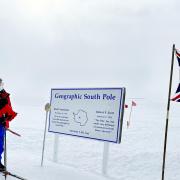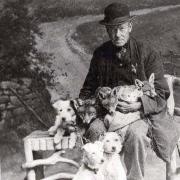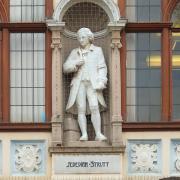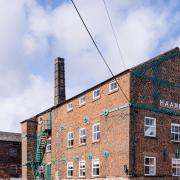A role that encompasses both day-to-day minutiae and values like 'integrity, trust, honesty and a commitment to public service'
It's a bit like steering and guiding a super-tanker, says Mick Creedon of his job as Chief Constable of Derbyshire. Or maybe conducting a massive orchestra. Warming to his theme, he suggests, 'It's about making sure that all the component parts are in place and have the tools they need to do their bit. After all, there won't be a rich sound for the audience if you've got a fantastic wind section but the strings aren't up to scratch.'
There is no family history of anyone joining the police force and he confesses that he only 'stumbled' into the job after graduating with a degree in economics and history from the University of Manchester. Having expected to do it for a couple of years, 'Sort out my financial mess after university and then go and do something proper,' he cheerfully reflects, 'It's really quite strange how it all panned out.'
'Once upon a time,' he says, 'I actually applied to be the England football manager - obviously that was a bit ambitious. On this occasion, they gave the job to a certain Ron Greenwood.' He had a management job with the Post Office; worked as a hospital porter and had ideas about travelling the world. There was no particular trigger for joining the Force, apart from the influence of a close friend who was joining the Metropolitan Police.He was 22, three years older than most of his fellow recruits, and joined Leicestershire Constabulary in 1980 at a time when graduates were something of a phenomenon. 'You could tend to stand out a bit - people didn't understand why someone with a degree would be in this occupation,' he remembers. 'And it was strange moving into what was then a totally new organisation to me - wearing a uniform, regimented hours, short hair, all the things I hadn't done as a student in the late Seventies.'
The biggest step was from 'being what I had been to being someone who had to be quite challenging. I didn't necessarily have the most suspicious nature on the street in those days.' He joined at a time when the service was involved in two mass movements of policing around the steelworkers' strike in 1980 and the miners' strike of 1984.
Of his time as a constable on the beat, he says frankly, 'I never was the best street cop. I worked hard and I was okay but I didn't have that natural feeling. There are people who are brilliant at neighbourhood policing, patrol officers who can just see something and instinctively know it's wrong. I never had that. I got a job as a detective and knew I was good at that. I've got a very inquisitive mind, I'm good on detail and I like talking to people, so the art of the interview of the suspect, of gathering information, of trying to think how that criminal would think and then negate their escape route, that intrigued me.'
Promoted from detective constable after two years, he was briefly a uniform sergeant before becoming a detective sergeant, a job he did for seven years. He regards that time as the best grounding he could possibly have had in learning about leadership and management. It also gave him exposure to some really interesting cases.
In a headline-hitting incident in December 1987, a helicopter was hijacked above Gartree top security prison in Leicestershire and two lifers, John Kendall and Sydney Draper, were sprung from the exercise yard. Kendall was recaptured after 10 days but Draper remained at large for 18 months, during which time Mick headed the investigation.
'I actually charged someone with hijacking. There aren't many police officers who've done that because it doesn't happen now,' he says with justifiable pride. 'It was a fascinating case.' Hard on its heels, he got involved in the historic child abuse situation perpetrated in Leicestershire care homes by Frank Beck - sentenced to five life terms in 1991 for offences against up to 250 victims.
'I was the lead officer in that for two years of my life. It was a horrific case that led to changes in the law and the selection and recruitment of residential social workers. It was the first of its kind in terms of residential care home investigations,' he says, adding soberly, 'I don't underplay the Beck investigation. So many lives were ruined and so many of the kids who were so badly abused went on to commit terrible things themselves or tried to commit suicide.
'Everyone thinks we kind of shut the door when a case is done, and that's not the case with anything, really.' The nature of such cases makes those handling the enquiry passionate to see it through, he says, observing, 'I think the simple thing you want to come out is the truth. You can get a bit cynical as a police officer and at times it can feel the court process is not necessarily about the truth, it is more about how evidence is presented, the admissibility of evidence, the interpretation of it, and how witnesses stand up to cross examination. Hopefully, the court process and the truth are one and the same thing, but sometimes for complex reasons some elements of evidence fail or are not admissible, meaning that police officers often become very frustrated.'
The approach of Frank Beck's defence team was to break the credibility of witnesses whom Mick describes with compassion as 'fairly dysfunctional, broken young adults. That's why they were in these particular residential care homes. It made the whole thing worse because they were vulnerable. So it was a lot of learning, both as an investigation but also about yourself and how you deal with these things. There were so many damaged individuals and you tried to mend their lives a bit, give them some worth.' Twenty years on, he still has contact with some of them.
The case concluded in 1991, when he was taking a year off to do a Masters in criminology. From then on, it was 'spinning plates.' He moved up the ranks in Leicestershire to become Head of the Specialist Crime Department and later, Assistant Chief Constable. He was a hostage negotiator for several years: a job which he describes as 'sometimes about conflict resolution, sometimes dealing with suicide interventions and kidnap cases.'
As the lead hostage negotiator for Leicestershire and then co-ordinator for all five East Midlands forces, he became heavily involved in the national agenda and retains the utmost respect for those who intervene and save lives. Many people each year are talked down from railway bridges and precipitous ledges at beauty spots in Derbyshire, and Mick wonders why they are sometimes drawn to such locations. 'Maybe it's the topography; maybe it's something to do with going to a beautiful place and then thinking about it. Negotiators are willing to talk them down, and time and time again will get a resolution and reduce that person's own chaos.'
With more than half his service gone, Mick Creedon was still a detective inspector and thoroughly enjoying the role. He was not career-driven, never envisaged making rapid leaps and believes he would not have done it without being 'encouraged, cajoled, supported, pushed and bullied' by those who saw his potential and encouraged him to go through national selection to chief officer.
He thought he would have 'one go at it', and got through, after which he joined the Derbyshire force in 2003. 'There I was, an Assistant Chief Constable in a new force, without ever having a huge career plan,' he says, reflecting that it is 'sometimes external influences that can motivate less career-driven people.'
Few professions can have seen so much change. Mick describes the service he joined in 1980 as having 'an element almost of Dixon of Dock Green policing. The uniforms we wore, the protection we carried - a 10 inch wooden truncheon, and a radio, and the radio didn't work very well in places. We still used to make what we called 'fixed points', so your sergeant would say, be at that point for three o'clock and that point for six o'clock.'Perhaps the biggest change between the 1950s and the 1980s was the move from whistles to radios, and this development over a number of decades is perhaps staggering compared to those within today's technology. Mick says, that 'if you guessed the wild possibilities for the next five years, it won't be wild enough. I don't think our minds can comprehend how fast technology is going. This force has 1,500 desktop computers, and IT systems hold a wealth of information that can tell huge amounts about people, places, events and crime.
'We've got officers wearing personal protection equipment that I think sadly makes them look almost quasi-military at times. I worry how it impacts on the public perception of policing but the reality is that because of health and safety, some of the many incidents over the years where officers have been badly attacked and killed, they have to have this equipment.'
It all requires constant training, updating and accreditation - 'There's a huge amount we ask of them. It's a radical, radical change. We're now moving down the path of mobile data, which means that officers will have the most fantastic data sets available to them on their person. They'll be out on the street more and don't need to go into the station, which is great, but it brings with it additional implications. It's a very different world.'
Fundamentally, though, the principles of policing are the same, he says: around public reassurance, crime prevention, crime detection and keeping the peace. 'I passionately believe they must stay the same. If we don't do those things, aren't answering the public's crisis calls, not actually providing some reassurance on reducing crime, not locking up bad people, we've got it wrong. The danger is you can almost become swamped by the technological changes and forget that deep down, people want the same things.'
He describes the Force as 'a massive pyramid of 4,000 people', entrusted with doing their job in the right place at the right time. Leadership is about 'instilling clear purpose of what we're about and a real understanding about what our priorities are as an organisation. And the big bits as well - what kind of values underpin being part of the organisation, and these include things like integrity, trust, honesty and a commitment to public service. It's a great job, fantastic, but it has its complexities and difficulties.'
As to the way the job is portrayed on TV, he comments with a smile, 'I always remind people that Life on Mars isn't actually a documentary, it's a comedy programme. I don't really watch them very much, although sometimes wish life were a little bit more like Heartbeat and one or two other of the dramas that we see on television.'
He is gradually adapting to his role as a public figure in a shire county 'kind of feeling my way. You work out what you do, how you present yourself, what your commitment is, what you go to and what you don't - I could go to something every day of the week and that's one of the dilemmas, because there's also this place to run. But it's good. It's part and parcel of the role because policing is an established part of every county and has been for hundreds of years.'
In his private life, Mick has many friends in the service but has always made a point of mixing with people outside policing as well. He met his wife, Sally, when they were both serving in the Leicestershire force, and she gave up her career after the birth of their first child, and Mick says, 'My family is the biggest thing that entertains me and keep me busy. It's good that I go back to a very wonderful but totally ordinary life with three children and a wife and friends who are totally outside it. Sally's support through all this moving through the ranks is paramount.'
If a child of theirs wanted to follow in their footsteps, would he encourage them? He says without hesitation, 'Yes, I would. If I speak to new recruits, I tell them this is an absolutely fantastic job. There's no question about it. It's given me more highs than I could imagine any job could do.'


























